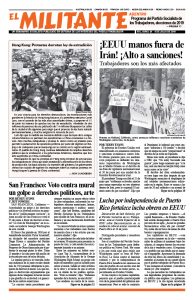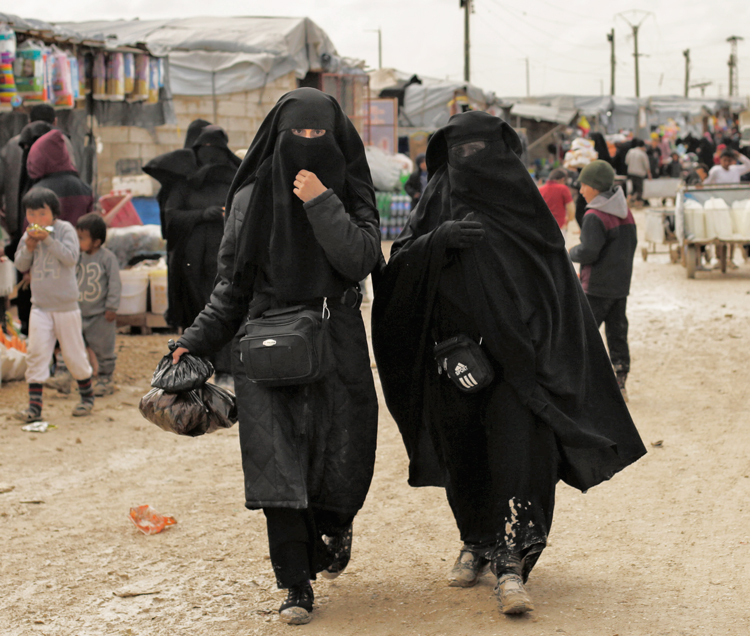Thousands of displaced former “wives” of Islamic State fighters, together with tens of thousands of children, many of them orphans, are being held in squalid, disease-infested camps in Iraq and Syria. Their reintegration into society is an important challenge in charting a working-class road forward in the region.
Many of the women were teenagers forced to be “child brides” or sex slaves by IS. Some were shot and wounded as they fled territories held by the reactionary Islamist outfit.
Security forces refuse to allow most of the women and children from Iraq or Syria to return to their home cities. Others come from outside the Middle East. A handful of their home countries have taken back a tiny number of citizens, but most won’t allow those who lived in areas under Islamic State control to return. They’re trapped in a stateless void.
The Iraqi government in Baghdad, dominated by political parties based on sectarian Shiite-religious politics, encourages forces that denounce the women, the majority or whom are Sunnis. “They should all be prosecuted or killed!” insisted Sheikh Mohammed Nasser al-Bayati, a powerful Shiite militia commander.
The European Union’s “anti-terrorism” chief, Gilles de Kerchove, justified the refusal of EU member states to repatriate them, claiming the children may become “the next generation of suicide bombers.”
Most of these supposedly dangerous children are younger than 12 years old. According to UNICEF, they are “among the world’s most vulnerable children [living] in appalling conditions amid constant threats to their health, safety and well-being.”
Cholera, tuberculosis, dysentery and typhoid are rife in the camps, and the children are malnourished. Many show symptoms of post-traumatic stress disorder, like vivid nightmares and the inability to speak.
Many of the women and even some of the children are being put on trial as Islamic State fighters. The women are often sentenced either to die by hanging or to life imprisonment after “trials” that often last no more than 10 minutes. The Iraqi government provides no information on the number of women who have been executed. However, New York Times reporters witnessed prosecution of 14 Turkish women accused of supporting IS that took a combined total of two hours. All 14 women were sentenced to death.
Women in the camps are targeted for sexual violence by militiamen and camp guards, including forced marriages. “These ‘marriages’ are just sex marriages, but you can’t say no,” Muntahar, a 16-year-old girl, told the Washington Post. “Then they take you for a week, or for a few months, before throwing you back into the camp.”
An estimated 45,000 displaced children being held in camps in Iraq do not have recognized birth certificates, the Norwegian Refugee Council said. As a result, they face exclusion from Iraqi society, being barred from school, denied access to health care, and prevented from working when they become adults. Without a valid birth certificate, newborns are unable to receive vaccinations in some areas.
Thousands more children, being held in camps in Syria, face the same fate. One of the largest of the Syrian camps, al-Hol, is surrounded by a chain-link fence and armed guards. Children make up at least two-thirds of its residents. Camp officials say they are too busy trying to provide tents and food to offer schooling and recreational activities, or deal with children’s often severe psychological problems.
Contrast with revolutionary Cuba
The contrast with how the children of the murdering and torturous cops and troops of the bloody dictatorship of Fulgencio Batista, overthrown by Cuba’s 1959 revolution, were treated could not be more stark.
Brigadier General Teté Puebla, the highest-ranking woman in Cuba’s Revolutionary Armed Forces in 1959, was asked by Fidel Castro, the revolution’s central leader, to head up the Department of Assistance to War Victims and their Families after taking power.
The children of Batista henchmen “were provided for the same as the children of the rebels,” Puebla says in her book, Marianas in Combat: Teté Puebla and the Mariana Grajales Women’s Platoon in Cuba’s Revolutionary War 1956-58, published by Pathfinder. The new department’s slogan was, “In the face of pain, the homeland makes no distinction. To save a child is to build the homeland.”
“Working-class organizations in the Middle East and around the world need to denounce the brutal treatment of the wives and children of IS members,” Alyson Kennedy, the 2016 presidential candidate of the Socialist Workers Party who was part of an SWP delegation to Iraq this year, said June 13. “We should demand their immediate release from the detention camps with all documents needed to freely live their lives and their repatriation to safe conditions where they can receive the medical care, education and social support they require.”
In April, Kennedy participated in the Erbil International Book Fair in the Kurdish region. Along with other leaders of the SWP and Communist Leagues in the United Kingdom and Canada, she met with leaders of the Kurdish Communist Party and area trade unions.
“One of the key questions we discussed,” Kennedy said, “is the necessity for working-class fighters to act as Russian revolutionary leader Vladimir Lenin explained more than a century ago, as ‘tribune[s] of the people … able to react to every manifestation of tyranny and oppression, no matter where it appears, no matter what stratum or class of the people it affects.’”


